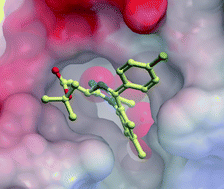Discovery of BET bromodomain inhibitors and their role in target validation
Abstract
Bromodomains (BRDs) are protein interaction modules that selectively recognize ε-N-acetylated lysine residues. BRDs are present in diverse proteins that play key functions in chromatin organization and regulation of gene transcription. Aberrant transcription is a hallmark of many diseases in particular cancer and inflammation. The complexity of molecular processes regulating gene transcription identified transcriptional regulators as interesting targets for the development of specific chemical tool molecules (chemical probes) that help to understand the molecular mechanisms of transcription and to explore the potential of BRD mediated interactions as sites for pharmaceutical intervention. Recently a number of highly specific inhibitors have been developed against the BET (bromo and extra terminal) family of bromodomains. The availability of selective BRD inhibitors had a significant impact on the validation of bromodomain-containing proteins as targets for drug development and for our understanding of the biological roles of these proteins. In this review we will summarize the discovery of BET bromodomain inhibitors and their roles in target validation.


 Please wait while we load your content...
Please wait while we load your content...